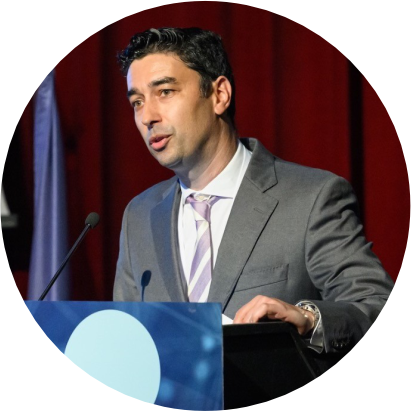Pioneering AI Governance, Innovation, and Impact
UNINOVA – Instituto de Desenvolvimento de Novas Tecnologias – is a multidisciplinary, independent, and non‑profit research institute founded in 1986 and based in the Lisbon metropolitan area. Created through a partnership between the Faculty of Science and Technology of NOVA University Lisbon (FCT NOVA), a group of industrial associations, a financial holding, and several pioneering companies, UNINOVA has grown into a hub for technological innovation and collaboration.
With a team of more than 180 researchers and professionals, UNINOVA is widely recognized for excellence in scientific research, technological development, and advanced training. Its mission is to transform cutting‑edge research into practical solutions, bridging the gap between academia and industry. Over the decades, the institute has contributed to countless European and international initiatives, leading advancements in areas such as systems interoperability, industrial integration, reconfigurable manufacturing, standards‑based activities, and future internet enterprise systems.
Within UNINOVA, the Center of Technology and Systems (CTS), and in particular the Group for Research in Interoperability of Systems (GRIS), drives the institute’s contributions to the AI‑DAPT project. GRIS brings together expertise in enterprise interoperability, data analytics, IoT ecosystems, and AI-driven innovation, positioning UNINOVA at the forefront of efforts to design and orchestrate next-generation AI pipelines. This multidisciplinary strength allows UNINOVA not only to advance digital transformation across industries but also to address pressing societal challenges, ensuring that research outcomes translate into tangible, sustainable impact.

Our Role in AI-DAPT
AI-DAPT is a Horizon Europe project with a clear mission: to redefine how data fuels AI. The project develops an AIOps framework that automates and contextualizes the entire AI pipeline, from data design to model optimization, while keeping humans-in-the-loop to ensure trust and accountability.
UNINOVA plays a central and multifaceted role in this vision:
- Leading WP6 (Dissemination, Communication, Stakeholder Engagement, and Exploitation), UNINOVA ensures that AI-DAPT’s innovations are shared widely, adopted by industry, and sustained beyond the project’s duration. UNINOVA drives the overall dissemination and communication strategy, coordinating the flow of information through events, publications, social media, and stakeholder networks. This work ensures that AI-DAPT’s research is not only visible but meaningful, creating bridges between the consortium, industry, academia, and policymakers. WP6 also steers stakeholder engagement activities, aligns AI-DAPT’s messaging with emerging European standards, and supports the identification and exploitation of key project assets.
- Driving T1.1 (Automated AI Pipelines End-User Needs, Ethics Analysis, Constraints and Considerations), UNINOVA spearheaded the process of understanding what industries truly need to adopt and trust next-generation AI pipelines. Through a design thinking approach, UNINOVA and its partners mapped the real challenges faced by diverse end-users when configuring and managing AI pipelines into user stories, technical and AI requirements. These efforts ensure that AI-DAPT’s framework is built on a holistic, user-driven foundation rather than a purely technical vision.
- Contributing deeply to WP3 (Hybrid Science-AI Models Foundations), where our expertise feeds directly into the development of novel methods for AI pipelines that bridge science-based models (first-principles) with AI/data-driven approaches. This work ensures that AI-DAPT models are not only powerful but also explainable, auditable, and aligned with European values of trust and accountability.
DAVE – Data Analytics and Visualisation Environment
One of UNINOVA’s flagship contributions is DAVE – Data Analytics and Visualisation Environment. DAVE is at the heart of AI-DAPT’s Pipeline Manager component, a visual, interactive solution that allows power users—those with deep data knowledge but limited coding experience—to design and manage complex AI and data workflows. With a drag-and-drop interface, pre-built data manipulation functions, and integration of AI/ML algorithms for training and deployment, DAVE enables intuitive, efficient, and scalable pipeline creation. It also automates execution scheduling and orchestrates workflows across AI-DAPT services, making it a cornerstone for operationalizing the project’s vision of automated, explainable, and human-in-the-loop AI.
Check https://code.grisenergia.pt/ai-dapt/dave/dave-docs for more information
Our Team
AI-DAPT brings together a dynamic UNINOVA team blending expertise in data engineering, AI, interoperability, and design. Bringing together senior researchers, PhD candidates and designers, the core team reflects the institute’s commitment to bridging cutting-edge research with practical industrial solutions.

Dr. Carlos Agostinho is a principal researcher at UNINOVA Center of Technology and Systems (CTS) and digital transformation expert. He holds a PhD in the area of industrial information systems by the Faculty of Science and Technology of the NOVA University of Lisbon (FCT/UNL) and has an MsC in Computer Science from the same school. Having a large experience in industrial driven research projects since CEN/AIDIMA/2002/004 funSTEP AP-DIS until the most recent H2020 VesselAI, Carlos is deeply committed to take research results closer to the industrial paradigm. Being quite experienced in research and coordination activities due to his work in several national and international research and development projects since 2001, Carlos is the author of more than 100 scientific publications in refereed journals and conference proceedings and developed skills in the areas of the Internet of Things (IoT), Enterprise Interoperability, Knowledge and Data Management, Integration of Complex Systems and Components, as well as Model-Driven Development.

Dr. Paulo Figueiras is a researcher at UNINOVA centre and has a MsC and a PhD in Electrotechnical and Computer science engineering. Deeply focused on the areas of knowledge management and the semantic web since 2009 and in Big Data and the Internet of Things domains since he started at UNINOVA in 2012, he has been working on several academic and research projects, namely FP7-ICT-318452 MobiS, FP7-ICT-288315 PROBE-IT and FP7-ICT-612329 PROASENSE, H2020-636160 OPTIMUM or H2020-780732 BOOST 4.0. Lately, relevant projects include H2020 i4Q and VesselAI. Main responsibilities within these projects are software development, technical and operational management, Data Engineering, Data Science, setup and deployment of Big Data solutions, user requirement elicitation, support and testing and validation of proofs-of-concept.

Bruno Rega is a researcher at UNINOVA CTS-GRIS and a PhD student at NOVA School of Science and Technology. He has an MSc in Electrotechnical and Computer Engineering. His work is primarily focused on the areas of Data Science, Big Data and Data Analytics & Visualization. Since starting the academic career, he has worked and contributed on a few research projects, namely H2020-780732 BOOST 4.0, H2020-958205 i4Q and VesselAI. The work done in these projects include Software Development, Data Engineering, Data Analytics & Visualization, Data Science and Development & Deployment of Big Data solutions.

André Grilo is a researcher at the Instituto de Desenvolvimento de Novas Tecnologias (UNINOVA), within the CTS, specializing in Electronic and Embedded Systems (GRIS). He holds an MSc in Electrotechnical and Computer Engineering and is currently pursuing a PhD in the same field. Throughout his research career, he has contributed to several projects, including H2020-780732 BOOST 4.0, H2020-958205 i4Q, and VesselAI. His primary contributions to these projects have involved software development, data analytics and visualization, data science, and the development and deployment of big data solutions.

Luís Lourenço is a researcher at UNINOVA CTS-GRIS and a PhD student at NOVA School of Science and Technology. He has an MSc in Electrotechnical and Computer Engineering and did his master’s thesis and an internship at the Volkswagen AutoEuropa automotive plan working in the project H2020-780732 BOOST 4.0. Since starting the academic career, he has worked and contributed on multiple research projects, namely H2020-958205 i4Q, H2020-957237 VesselAI and RE4DY. The work done in these projects include Software Development, Data Analytics & Visualization, Data Science, Development & Deployment of Big Data solutions and support, testing and validation of proofs-of-concept.

Marisa Constantino is a talented Designer at UNINOVA, where she takes charge of graphic design and various advertising tasks in numerous projects. Holding a bachelor’s degree in Game Design from the Instituto Politécnico de Bragança, Marisa possesses a versatile skill set encompassing 3D, 2D art, Webdesign, and even Social Media management. Beyond her commitment to UNINOVA, Marisa functions as a part-time freelancer, leveraging her expertise to deliver creative and impactful ilustrations and design solutions. Her dedication to innovative visually compelling solutions underscores her commitment to excellence in the field of design.
Experience the Future with UNINOVA
UNINOVA’s role in AI-DAPT goes beyond technology. It’s about research, training and real-world impact. By leading dissemination, identifying end-user needs, and powering the AI pipeline framework with DAVE, UNINOVA ensures that AI-DAPT’s innovations don’t stay in the lab but reach industry and society at large.
As AI-DAPT progresses, UNINOVA will continue to drive engagement, foster trust, and deliver solutions that make AI more transparent, explainable, and human-centric – supporting Europe’s ambition for sovereign and sustainable AI.
